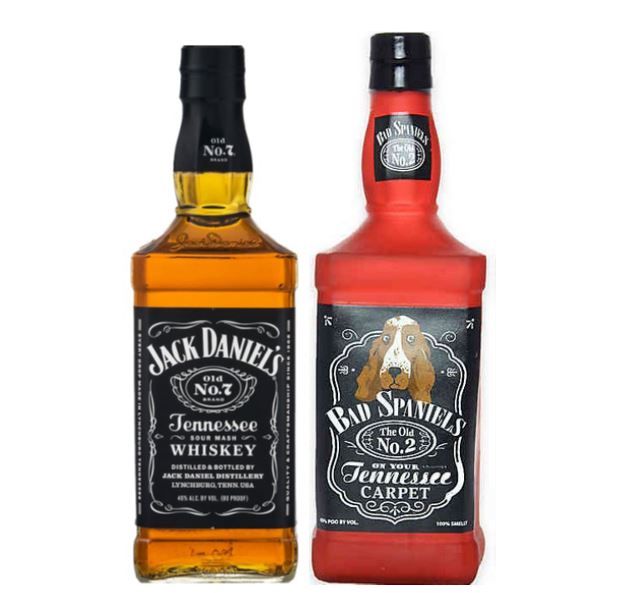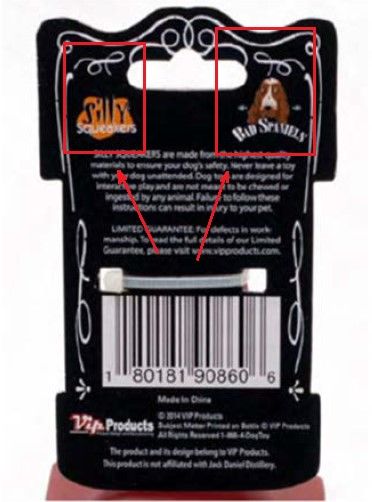Jack Daniel's Properties surely bought a round (or two) for its legal team yesterday to celebrate the Supreme Court's unanimous holding that a parody dog toy's use of the mark BAD SPANIELS and copycat trade dress as source identifiers disqualifies it from any special First Amendment protection when considering whether those trademarks infringe Jack Daniel's rights in its JACK DANIEL'S mark and related trade dress. Though the Court stated its opinion was "narrow," the decision is nonetheless a win for trademark owners seeking protection from confusing parody marks.
Background
Jack Daniel's owns several federal registrations covering its famous whiskey bottle, including brand names appearing on the label (such as JACK DANIEL'S and OLD NO. 7) and the trade dress in the bottle itself. VIP Products makes and sells a chewable rubber dog toy called BAD SPANIELS designed to evoke Jack Daniel's famous whiskey bottle, but adding scatological humor, such as "43% poo by vol." and "100% smelly" for "40% alc. by vol. (80 proof)," and "Old No. 2 on your Tennessee carpet" instead of "Old No. 7" and "Tennessee whiskey":

Jack Daniel's demand letter to VIP was met with a lawsuit seeking declaratory judgment that the BAD SPANIELS dog toy neither infringed nor diluted Jack Daniel's marks. Jack Daniel's responded with counterclaims for trademark infringement and dilution by tarnishment. After a bench trial, the United States District Court for the Central District of California ruled for Jack Daniel's on both claims, finding, among other things, that survey evidence established that consumers were likely to be confused about the source of the BAD SPANIELS toy.
Not willing to give up in this dogfight, VIP appealed to the Ninth Circuit, arguing that the expressive, parodic nature of the BAD SPANIELS mark and trade dress were sufficient to shield it from trademark infringement and dilution liability. On appeal, the Ninth Circuit did not disturb the lower court's finding of likelihood of confusion, but nonetheless reversed. According to the Ninth Circuit, Jack Daniel's infringement claim was subject to the threshold Rogers v. Grimaldi test, under which an expressive work may cause confusion provided the use of the mark is (1) artistically relevant and (2) not explicitly misleading. Because the BAD SPANIELS toy is an "expressive work" that "communicates a humorous message," the Ninth Circuit held, the lower court should have first applied the Rogers test before moving to the likelihood-of-confusion analysis. On remand, the district court found that Jack Daniel's failed to satisfy either prong of Rogers and granted VIP summary judgment on the infringement claim.
The Ninth Circuit also awarded VIP judgment on its dilution claim, finding that the Lanham Act's exclusion for "noncommercial use" shielded VIP from liability. "[U]se of a mark may be noncommercial, even if used to sell a product," the court stated. According to the Ninth Circuit, because it parodies and "comments humorously" on Jack Daniel's bottle, VIP's dog toy qualified for this exclusion.
The Unanimous Supreme Court Decision
Criticizing the Ninth Circuit's analyses of the Lanham Act, the Supreme Court vacated VIP's victories and remanded the case to the district court. Writing for the court, Justice Kagan determined that the primary mission of trademark law is to prevent confusion about the source of a product or service. Making consumers "think that one producer's products are another's," the Court explained, is the Lanham Act's "cardinal sin." Accordingly, the Court held that Rogers (or any other threshold First Amendment filter) does not apply "when an alleged infringer uses a trademark in the way the Lanham Act most cares about: as a designation of source for the infringer's own goods."
This threshold issue holds true, the Court held, even where the allegedly infringing mark includes expressive content or conveys some message beyond source. "[F]ew cases would even get to the likelihood-of-confusion inquiry if all expressive content triggered the Rogers filter. In that event, the Rogers exception would become the general rule, in conflict with the courts' longstanding view of trademark law." But in such cases, the expressive use of a mark is not wholly irrelevant. The parodic nature of BAD SPANIELS remains pertinent to the likelihood-of-confusion inquiry "because consumers are not so likely to think that the maker of a mocked product is itself doing the mocking."
As to whether VIP used BAD SPANIELS as a source identifier, the Court held that VIP had already conceded the point. While it owns no registered rights, VIP's complaint alleged that it both "own[s]" and "use[s]" the BAD SPANIELS trademark and trade dress for its dog toys. Though VIP tried to escape these admissions as mere "form allegation[s]" or "rote" matters, the Court was unimpressed with VIP's attempt to extrapolate itself from its own complaint. And, in any event, the Court noted that VIP had gone further. Specifically, the Court studied the BAD SPANIELS product hangtag, noting that "the Bad Spaniels logo sits opposite the concededly trademarked Silly Squeakers logo, with both appearing to serve the same source-identifying function":

Further, VIP had consistently argued that it owns trademark and trade dress rights in its other parodic dog toy products and has even registered several with the USPTO. The Court therefore easily concluded that VIP used BAD SPANIELS as a trademark—i.e., as a source identifier.
The Court also made short work of VIP's dilution defense. Under the dilution statute, exceptions are made for "noncommercial use[s] of a mark" and for "fair use" of a mark in connection with parodies or criticism. But the fair-use exception explicitly does not apply if a defendant goes beyond parody or criticism and uses the mimicking mark as a source identifier. In such cases, "no parody, criticism, or commentary will rescue the alleged diluter." Exempting all parody from dilution claims as the Ninth Circuit did, "effectively nullifies Congress's express limit on the fair-use exclusion for parody, etc."
Accordingly, on remand, the district court is tasked with determining whether VIP's products are likely to cause confusion with the JACK DANIEL'S mark and trade dress and/or whether they dilute those marks by tarnishment.
The Concurrences
Justice Sotomayor's concurrence, joined by Justice Alito, addressed the use of consumer surveys in trademark infringement cases. Specifically, they warned lower courts to treat survey results with caution. "When an alleged trademark infringement involves a parody," Justice Sotomayor wrote, "there is particular risk in giving uncritical or undue weight to surveys." According to the concurrence, survey respondents sometimes mistakenly believe that all parodies require permission from the owner of the parodied mark. Justices Sotomayor and Alito are concerned that Plaintiffs may use this legal misunderstanding as evidence of confusion, and cleverly designed surveys could prompt such confusion by making consumers think about complex legal questions around permission that would not have arisen naturally in the marketplace. "Well-heeled brands," the concurrence cautioned, "with the resources to commission surveys would be handed an effective veto over mockery."
Justice Gorsuch's concurrence, joined by Justices Thomas and Barrett, signaled a readiness to reconsider the Rogers test in its entirety should the issue be presented to the Court. This concurrence underscored that "it is not entirely clear where the Rogers test comes from." Uncertain whether it was, in fact, constitutionally mandated, these Justices further expressed doubt that the Rogers decision was correct in all its particulars. Lower courts, they cautioned, should therefore treat Rogers with care.
Takeaways
In the past, Rogers has provided an "off ramp" to litigation for defendants whose products are expressive in nature, especially if they parody, comment on, or criticize the original trademark, allowing them to avoid more involved and costly likelihood-of-infringement battles. Though Rogers survives and will continue to offer protection to parodists and critics going forward, this case makes clear that it is a "cabined doctrine," requiring a showing that the allegedly infringing use is not itself a trademark/source identifier. Parties who want to assert trademark rights in their parodies or critiques may now find the off ramp closed.
The case is Jack Daniel's Props., Inc. v. VIP Prods. LLC, 599 U.S. __ (June 8, 2023).
See also https://www.finnegan.com/en/insights/blogs/incontestable/scotus-trademark-twofer-the-lanham-acts-territorial-reach-and-the-parody-defense.html and https://www.finnegan.com/en/insights/blogs/incontestable/good-day-for-bad-spaniels-ninth-circuit-holds-dog-toys-do-not-infringe-jack-daniels-marks.html
The content of this article is intended to provide a general guide to the subject matter. Specialist advice should be sought about your specific circumstances.

